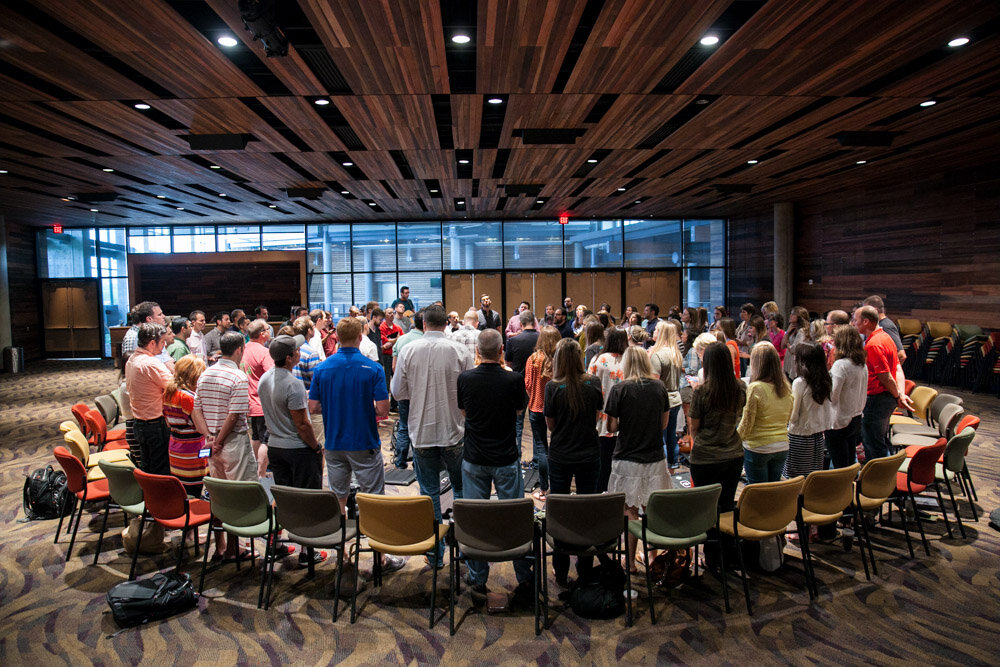14 Lessons Learned and Reasons to be Grateful (Part 1 of 2)
This Friday, June 5th, will be my 14th anniversary on staff at Watermark Community Church. It's also my last day. That comes out to 5,114 consecutive days as a pastor and employee at Watermark.
The headline of this post is that I couldn’t be more grateful for my time on staff. It would be near impossible for me to rightly capture my gratitude for the leadership, staff, and body of Christ at Watermark.
In today’s post (part 1 of a 2-part series), I’m sharing 7 of the top 14 lessons I’ve learned in 14 years of full time vocational ministry at Watermark. I found the task of boiling down 14 years of ministry to 14 lessons near impossible, but this is my best stab at it.
Season 7, Episode 22 of The Office (Goodbye, Michael), is Michael Scott’s last episode as the Regional Manager of the Scranton Branch of Dunder Mifflin. In the last scene before he leaves, he looks out at the office and sees life going on like normal—Dwight’s on the phone, Kelly and Ryan are talking to each other, and Creed is drinking coffee (out of Michael’s “World’s Best Boss” mug). He walks away and life goes on.
In the same way, on Friday of this week, I’ll pack up my office and life will go on. Sermons will be preached, marriages will be restored, and eternities will be changed. My staff co-laborers will enjoy the weekend and then come back on Monday and do what they do. Yes, they’ll miss me, and I’ll miss them (a LOT), but God’s church will continue doing what the church does. And I’m so grateful.
Which leads me to the first 7 of 14 lessons learned and reasons to be grateful.
7 Lessons I've Learned and Reasons to be Grateful for 14 Years of Vocational Ministry at Watermark.
1. I’ve got a whole lot to be grateful for.
I hated living in Dallas and didn’t even like Watermark the first four years we attended the church while I was a seminary student. I even sent out resumes to other churches my first year on staff and wanted to leave Texas.
What a fool (especially as we move deeper into the heart of Texas to Waco).
In 1 Thessalonians 5:16-18, Paul writes, “Rejoice always, pray continually, give thanks in all circumstances; for this is God’s will for you in Christ Jesus.”
God's teaching me what it means to give thanks in all circumstances.
In my 14 years as a staff member at Watermark, EVERYTHING in my life has changed.
My marriage
My four sons (16, 16, 13, 11)
Our friendships and community
My wellness
My personal walk with Jesus. I’m not perfect (very far from it), but I’m a fully devoted follower of Jesus Christ
I’ve got a whole lot to be grateful for and am learning to genuinely give thanks in all circumstances.
2. God doesn’t need any of us, but He allows us to be a part of His work.
I remember it like it was yesterday. One of my teammates left staff and I thought the ministry she led was over and ruined. For some reason, I believed the ministry was dependent on her presence and leadership. I was sorely mistaken.
In Matthew 16:18, Jesus says the gates of hell will not prevail against His church. God is not dependent on me being on staff or any individual or ministry. His church will prevail. That’s why I shared this story above. His church will prevail, with or without you and me. I’m grateful we get to be a part of His work, but don’t confuse that with the notion that He needs you or me.
3. Don’t compromise the calibre of leader just because there’s a need.
I learned this one the hard way. We’re always looking for leaders in ministry—it’s the way God designed the body of Christ to work most effectively. And many times the need is greater than the supply.
Early on I learned not to compromise who leads just because there’s a need for leaders. When we do:
The leader suffers because they’re not ready or equipped to lead.
The participant couple suffers because they’re not led by a couple ready to lead (1 Corinthians 11:1).
The communication of the gospel of Jesus Christ gets compromised because the focus is shifted away from the Truth and towards the leader couple.
The staff suffers because you end up cleaning up a lot of messes.
Every time my discernment meter goes off as I interview a couple to lead, I’ve learned to slow down and hit pause before compromising the calibre of the leader.
4. Don’t look for or expect perfection in a leader.
The corollary to #3 is that people are much more equipped to lead than they think they are. They’re going to be scared and feel ill-equipped. They’ll compare themselves to others. They’ll think they’re not qualified because their marriage or walk with Jesus isn’t perfect.
Instead, this means they’re human beings and doesn’t mean they’re not necessarily ready or equipped to lead.
2 Peter 1:3 says, “His divine power has given us everything we need for a godly life through our knowledge of him who called us by his own glory and goodness.” God has given us everything we need to lead—His Word, His people, and His Spirit.
I’m so encouraged at what I’ve seen through “normal people” in the last 14 years. It’s been a privilege and honor watching God use very imperfect people to lead and disciple others at Watermark Community Church.
5. People aren’t looking for perfect examples; they’re looking for living examples.
I credit my friend Lance Sisco with this one. We’re not looking for perfection in others. Rather, we’re looking for real life human beings who can admit they’re weak and struggle (2 Corinthians 12:7-10). Nobody wants to be led by someone who does everything right and thinks they’re perfect! That person doesn’t exist, and if they think they do, I don’t want to be led by them.
Rather, admit when you mess up. Tell stories of how you had to apologize and ask for forgiveness.
We don’t want you to pretend to be perfect. We just want you to be real.
6. Know yourself. Like yourself. Be yourself.
This is the first thing I remember hearing and learning from Watermark’s lead pastor, Todd Wagner. As an insecure seminary student from 2002-2006, I didn’t like my gifts and wiring and just wanted to be like everyone else. I looked around at everyone’s gifts and wanted to be like them. I wanted to be bold like Todd, smart like John, counsel like Mandy, or funny like Braun. And I certainly didn’t want to be like Scott.
In the moments when I’ve most struggled in ministry, I forgot this lesson. In those days when I embraced and lived out this message, I’ve thrived. There have been way too many days when I’ve forgotten this lesson, but by God’s grace I’m living it out more and more.
I wrote more about this one in: The Most Important Lesson I Learned in 10 Years of Ministry.
Thank you, Wags.
7. Work with people you love.
This staff. What a gift. I’m tearing up as I think of the men and women I’ve worked with over the last 14 years. When I started, there were around 30 employees. As I leave, I’m not even sure how many are on staff—let's just say it's a lot. I’ve worked with some legends. Most weeks I sit in awe in our staff meetings as I think of the character and calibre of my co-workers.
At Watermark we talk about three levels of trust: professional, spiritual, and relational. At the risk of oversimplifying, here’s a quick description of each.
Professional - take your job seriously and work with excellence, using skills you possess and learning what you don't know.
Spiritual - make sure your relationship with Jesus Christ is healthy and you’re doing all you can to be a fully devoted follower of Jesus Christ.
Relational - do all you can to make sure all work relationships are strong and growing, resolve conflict, and seek health in all relationships.
All three trusts are important, but I’ve learned spiritual and relational trusts must be solid. Most people can learn how to do their jobs (professional), but if you’re not walking close to Jesus and striving for peace and unity with co-workers, then we’re going to have troubles. Most of the challenges I’ve had with folks on my team are not professional—they’ve been spiritual and relational problems.
Work with people you love and fight for professional, spiritual, and relational trust.
In Part 2, I'll share seven other reasons I'm grateful for 14 years on staff at Watermark.
Your Turn:
What’s a lesson you’ve recently learned in your home or job?
How do you keep track of what God is teaching or showing you?
Click here to read Part 2 in this 2-Part series.


